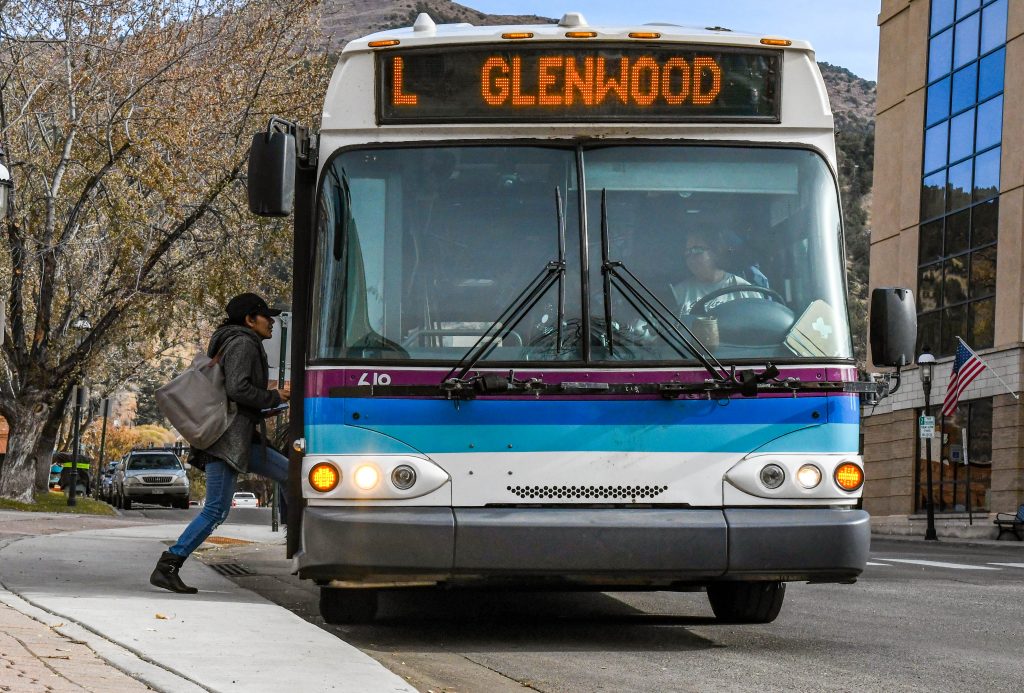Garfield County funding remains uncertain for RFTA Hogback route future

Post Independent archives
Public transportation has become a growing concern in Garfield County lately, particularly between Parachute to New Castle. The city of Rifle has recently heard from many groups such as Parachute Area Transportation System, PATS, and a survey done from the Western Colorado Alliance, particularly about transportation needs in the region
At their most recent meeting on Nov. 6, Rifle City Council heard a presentation by Roaring Fork Transportation Authority Chief Executive Officer Kurt Ravenschlag about RFTA’s Hogback service between Rifle and Glenwood Springs. Many Parachute residents use PATS to connect with the Hogback route to travel farther upvalley.
Ravenschlag presented to the council regarding ridership and how it has increased steadily since 2020, from 2.6 million to now 5 million, which was around the pre-COVID numbers throughout all the services RFTA offers.
RFTA services three counties: Garfield, Eagle, and Pitkin, from Aspen all the way to Rifle, with 26 bus routes and 166 bus stops. Buses make 22 daily trips from Rifle to New Castle, and 46 daily trips from New Castle to Glenwood Springs.
A recent onboard survey found that 41% of Hogback riders boarded in Rifle, 37% in Glenwood Springs and 16% in Silt. Most riders, 56%, exited in Glenwood Springs, while 15% each exited in New Castle and Aspen.
“Everytime we do this onboard survey, we hear our customers asking for more service to Rifle,” Ravenschlag said. “We wish we could, but just due to the arrangement we have with Garfield County, we provide the level of service that they’re providing funding for.”
Some barriers found from the survey, similar to the one done by Western Colorado Alliance, saw that buses are not frequent enough and not being on time were large barriers to riding the bus.
The city of Rifle contributes to the Hogback Service funding, and in 2026, will be providing $80,000. The town of Silt also contributes and has $40,000 in the 2026 pot.
“Historically, this service has been provided by Garfield County, they were providing around $750,000 maximum…which at the time was the cost of the Hogback Service,” Ravenschlag said. “Over the last six years, the county, just due to budget constraints, their contribution to RFTA for this service has continued to drop each year.”
Ravenschlag said they were notified over the summer that, due to budget constraints, that Garfield County was recommending pulling all funding from their contribution.
“That changed as of two weeks ago,” Ravenschlag said. “The county commissioners, they met, and apparently there had been a mayors’ meeting that Commissioner [Mike] Samson holds, and he indicated the mayors and others in attendance were urging the commissioners to not eliminate funding for the Hogback entirely.”
Ravenschlag said Samson went to a meeting the next day and recommended increasing the portion of service from zero to $250,000 for 2026.
In total, the Hogback Service will see a gross fund of $922,000, though despite growing contributions from Rifle and Silt, it wasn’t enough to cover the shortfall of $478,200, which the RFTA board agreed to cover.
Ravenschlag said RFTA is exploring new funding options for the Hogback service beyond 2026.
Councilor Clint Hostettler questioned why upvalley municipalities that benefit from Rifle and Silt commuters do not contribute to the route.
“There’s not a lot of Rifle people traveling to Battlement Mesa,” Hostettler said. “When you go through all the entities that are making contributions to the Grand Hogback, I don’t see Glenwood or Carbondale or Aspen making any contributions.”
Hostettler asked Ravenschlag to keep an open mind about those entities also contributing to the Hogback Service. Ravenschlag said that the Board of Directors are Glenwood Springs and Carbondale, and the other upvalley municipalities and other counties.
However, the municipalities themselves have not contributed to the funding.
“The same questions, the same proposal keeps coming back year after year after year,” Councilor Alicia Gresley said. “What you’re doing is you’re taking our people out of our communities and taking them up to other communities…Why is the burden placed on the people of Rifle in order to support the economy upvalley?”
Ravenschlag emphasized that RFTA values its connection to Rifle and has covered more than $200,000 annually in recent years to offset Garfield County’s reduced funding.
“[RFTA] is very interested in having Rifle connected to our greater region,” Ravenschlag said. “They have been funding that shortfall from Garfield County for the last five years, so each year they’ve been providing over $200,000 dollars to fund this connection to Rifle because we know it’s important to the residents of Rifle.
Hostettler said it’s also important to the people in the communities of Aspen, Glenwood Springs and others upvalley.
Ravenschlag said that the money made in the upvalley communities from Rifle and Silt residents is then spent in Rifle and Silt.
“If the council doesn’t have an interest in providing that connection to its residents, that’s fine,” Ravenschlag said.
Gresley said it’s not about disinterest but about fairness, adding that western Garfield County communities often feel used to sustain upvalley economies.

Support Local Journalism

Support Local Journalism
Readers around Glenwood Springs and Garfield County make the Post Independent’s work possible. Your financial contribution supports our efforts to deliver quality, locally relevant journalism.
Now more than ever, your support is critical to help us keep our community informed about the evolving coronavirus pandemic and the impact it is having locally. Every contribution, however large or small, will make a difference.
Each donation will be used exclusively for the development and creation of increased news coverage.









